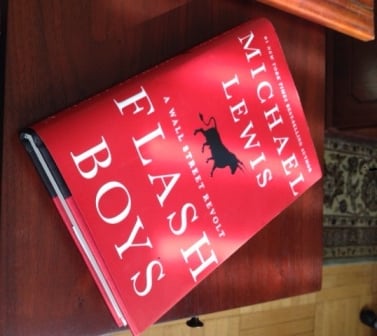No doubt you've heard about Michael Lewis' new book, "Flash Boys."
And, no doubt you've been hearing more than ever before about the subject of Lewis' book, high-frequency trading (HFT).
I ran to Barnes & Noble to buy the book the second I heard about it last week. They didn't have any copies. So, I ordered it online, which was cheaper anyway.
It was waiting for me when I got home Saturday night. I finished it by Sunday morning. Although it's only 271 pages, it took me 12 hours to read it because I wanted to savor every word and let it soak in.

Well, let me say this about high-frequency trading and Michael Lewis' book:
HFT is a bad juju, and Lewis' book is absolutely, positively, indisputably sheer genius.
Michael Lewis' books are amazing because they are so human, they reach into places it's hard to get to, and we journey with all his characters down their paths, remarkably coming to exactly where Lewis takes us: to enlightenment.
Read the book. It will stagger you. The truth about how the markets have been "rigged" could not have been better laid bare. You won't be able to put it down. You will have multiple - and I mean multiple - "aha" moments. It's a fantastic voyage into the market.
I've been writing about HFT for many years now. And you can read my brief history of how the markets came to the point where HFT took root and the short version of how HFT works.
I wrote that last Friday. Lewis' book confirms everything I've ever written about HFT.
I'll admit, I wanted to set up an HFT desk myself back in 1999. The handwriting was on the wall and I could already see how traders could make a lot of money on it. I could see where everything was going.
My only problem was that I couldn't convince my hedge fund partner at the time that we needed to go in that direction.
We were running huge amounts of algorithmic trades that required precise execution at very tightly defined (if not exact) prices, and that was hard to do because markets were already fragmented.
We had to go to several ECNs (electronic communications networks) and exchanges to get our fills, and in the process of trying to get our sizable orders filled, we moved markets. That's not what you want to do.
The simple answer was to create an engine that was fed with all quotes (bids and offers and size of shares being bid for and being offered for sale) from every ECN and exchange and trading venue, in order to "see" where the stock was that you wanted, and to be able to go to all the venues and transact on them simultaneously to get an average price as close to our required target price as possible.
And as we were discussing what we needed to get started - the T1 lines for all the data feeds, the amalgamation engine, the speed in and out, and whatever regulatory clearance we might need - something occurred to me in a flash.
Here's what it all really meant, in all of its (scary) genius:
If we did it right, we would have had a window into the movement of quotes throughout the entire "book" of every stock at every venue we were capturing.
And as prices changed, we'd see how the quotes reacted. Those quotes were the "psychology" of traders and market-makers. By their very movement we could discern patterns of interest in buying or selling the stocks as we were watching every breath they took. We could see trends before individual market-makers and traders. We could game the system.
It was a way to make sense and money out of the fragmentation that was actually costing us performance.
Would I have gone down the path that HFT players took? I'll be honest; at the time, I would have.
There are some things you can blame HFT guys for, like being greedy. But most of the things we want to hate them for isn't "cheating." They are institutionalized opportunities that they helped make for themselves given where the markets were going and what the regulators and exchanges aided and abetted.
Now, attorneys general, the FBI, and the Justice Department are looking into HFT.
Are HFT players criminals? No, they aren't. Are they smart? You better believe it.
They're smart, not in the sense that they bet on the stock market and are good traders using good judgment of fundamentals or technical analysis, or even algorithms.
They're technology smart. They are computer smart. They are rocket scientist smart.
They simply look at the technological systems that are the backbone and infrastructure of the market and they figured out how to game the system's architecture by getting into the edifice's vents and listening and watching to all the office chatter in every nook and cranny of every room in the building.
It's creepy, but that's the other side of technology.
HFT would never have come about if the technology wasn't there.
It's not sour grapes, though maybe a little, but the advantage HFT players have has gone too far and has to be addressed, as in stopped. But they're not criminals.
Welcome to the Brave New World.
Just-Released: The true winners in the IPO market aren't the big names that are hyped up by the mainstream media outlets. Here's a guide on what to buy - and when to buy.
Tags: flash boys, flash boys book, flash boys by michael lewis, HFT, high frequency trading, IEX, IEX exchange, is HFT legal, Michael Lewis, michael lewis flash boysThe post Why You Need to Read Michael Lewis' New Exposé appeared first on Money Morning - Only the News You Can Profit From.